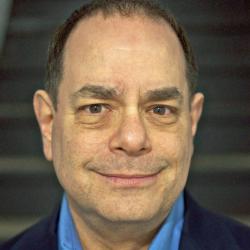Digital Wisdom vs. Digital Stupidity: Five Questions for Brain Gain Author Marc Prensky

Photograph courtesy Marc Prensky.
In Brain Gain: Technology and the Quest for Digital Wisdom, published earlier this month, writer and consultant Marc Prensky looks to quell the fears of those who think we are becoming dumber as we become more dependent on our machines. Instead, he argues that this reliance can be beneficial and could even better the human race—but only if we are wise about it. The storage capacity of certain machines is larger and more reliable than the human brain. Our access to databases and programs that carry out complex computing functions allow us to complete tasks that we are not capable of or at least cannot complete quickly. Here, Prensky discusses digital wisdom and explains why technology is transforming us for the better, not diminishing “real” relationships.
What gave you the idea for the book?
The very first germ was when I heard many years ago of the idea that doctors, no matter how much experience they have, can’t necessarily make the best judgments [on their own] because certain decisions—for example, who stays in the ICU and who leaves—have to be based on cumulative data, on millions of data points of people who’ve had the same things, to see who would get better and who wouldn’t. And that’s a wiser way to do it. So it occurred to me the best way is to combine technology with human judgment. And that’s what I call digital wisdom.
How do you feel about technology like Google, Wikipedia, and auto-correct, which allow people to forget basic knowledge like spelling?
It all depends on what your definition of what basic knowledge is. Spelling was basic knowledge when we didn’t have spell check. Now, why should spelling be basic knowledge? A machine can do it better. I’m not saying that these things are perfect. I’m not saying that we don’t have to add judgment to them. For example, in the Gettysburg address, Lincoln says, “that that nation might live.” Well, there should be two “that’s” there, even though a computer might flag it as a potential error. A human has to decide. But what used to be considered the right thing to do in terms of basics, no longer is.
Math is another great example. Most of what we teach is calculating. [But] that’s not the basics of math anymore, because machines do it much better. The basics of math are understanding what the problem is, how to set it up in mathematical terms, and whether our answer makes sense.
In Brain Gain, you mention William Powers’ 2011 book Hamlet’s Blackberry: Building a Good Life in the Digital Age, which recommends taking “digital Sabbaths,” in which people turn off their devices and spend a day offline. You write that you don’t think such scheduled disconnected time is necessary. Have you ever tried disconnecting? How did it turn out?
The problem that I have with Powers’ ideas, and others like him, is that they think that just because you’re having human contact, face-to-face, it’s better. And the answer is, not necessarily. Most human face-to-face contact and discussions are about the weather, and they’re not in any sense deep. But there are plenty of deep connections that can be made through technology. So I think you’re just impoverishing yourself [if you take a digital sabbath]. If you decide that you have to do this for your own good, you can do that. But essentially, it’s making you less human, not more human.
You discuss “digital stupidity” in your book, which is when one does not take full advantage of technology, or uses it improperly or carelessly. What's the digitally stupid thing you do most often?
My digital stupidity comes from ignoring the fact that there’s so much online. If I need a train timetable or if I need tickets to something, I won’t automatically assume I can do it online. I think the biggest one I would say, is not realizing all the powerful tools that I have with me at all times.
What's next for you?
I would like to really make the conversation about technology one about digital wisdom, and not just about whether you use it or not—how you use it wisely. That’s the problem that powers it all. The question is not, “Do I use it or don’t I use it?” The question is, “How do I use it wisely?” because it’s now a part of us.
I also am interested in thinking about how we do education. What’s important? I’m writing a book on what I call “zero-based curriculum.” What would we teach if we didn’t have to teach anything? If math and reading and writing and everything else in the curriculum were off the table? What would we put back on the table as being essential for humans in the 21st century? That’s a real big concern of mine.
This interview has been lightly edited and condensed.
Future Tense is a partnership of Slate, New America, and Arizona State University.
